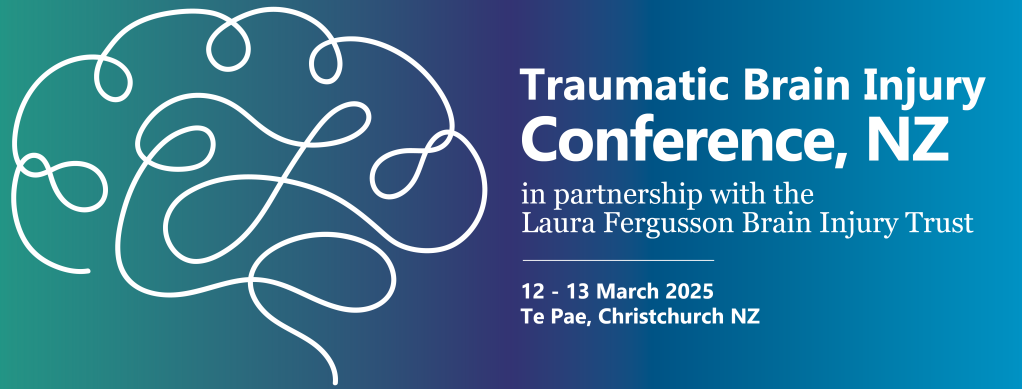CALL FOR PAPERS
Call For Papers Closed
General Information
Paper abstracts/synopses/submissions are invited for the Traumatic Brain Injury Conference NZ, to be held in Christchurch NZ in March 2025.
Scheduled over two days to provide extensive clinical knowledge, the conference will explore life real stories and provide a significant number of continuing education topics. The conference will run on Wednesday 12th March and Thursday 13th March 2025.
The conference theme is:
Keeping it Real: Real Injury, Real People, Real Lives
Real Injury: an opportunity for presentations about new exciting research and studies, injury related topics
Real People: an opportunity for people to present the lived experience stories as well as family members/support people, e.g. parenting and caring after brain injury, compassion fatigue for carers and navigating family /whanau relationships. Vocational development and employment.
Real Lives: an opportunity for speakers to talk about services, new resources, treatment considerations after Brain Injury, wellness Initiatives following Brain Injury, the role of nutrition post brain injury, applied technologies in rehabilitation and recovery, housing solutions, carer supports, advocacy that enable people to lead good lives.
Audience
The conference is aimed at medical professionals, nursing and allied health professionals, students, education providers, Corrections, Police, housing, drug and alcohol service providers, mental health services, NGO providers, government agencies, sports codes, technology providers/developers, carer agencies, researchers, those with lived experience and their families, support networks, advocacy groups.
Concurrent educational sessions (i.e., workshops) will feature as part of the programme and approximately 75 individuals attend each session; session audiences include a mixed representation of attendees. We anticipate conference attendance to be in the range of 250 delegates.
Presentation Proposal Submission Guidelines
- Individual, group, or panel presentations may be submitted. Group or panel presentations that include professionals and persons with brain injury are encouraged.
- Individuals or groups may submit more than one proposal, but a separate proposal must be completed for each presentation.
- Submission of a proposal does not guarantee that your presentation will be selected.
- If you wish to submit a paper for consideration for the conference programme, you must also intend to register for the conference.
- The Conference Committee reserves the right to make final presentation selections, to combine proposed topics and presenters, and to edit the abstracts.
- Presenters must be careful to use disability-sensitive language throughout their submission (e.g., using “person first” terminology, avoiding stereotypes).
Why Submit?
The writing and presentation of papers is an important part of every person’s professional development and training. It provides an opportunity to share your experience and innovative work among enthusiastic and knowledgeable peers.
Presentation Selection Guidelines
Topics should reflect the conference theme of Keeping it Real: Real Injury, Real People, Real Lives and relate to at least one of the suggested topics listed below:
Priority Topics
Tamarirki and Rangatahi Issues (Paediatric and Adolescent Issues)
- Recovery and developmental milestones after paediatric brain injury
- Rehabilitation considerations for rangatahi (adolescents) after brain injury
- Parenting after brain injury
- Schooling challenges and supports across the educational system
- Navigating family/whanau relationships within a cultural context
- Re-building social connections for rangatahi (adolescents) with brain injury
Whare Hauora Wellness Topics
- Mirimiri and Romiromi
- Pilates, yoga, meditation, mindfulness, tai chi
- The role of nutrition after brain injury
- Rongoa Māori post brain injury
- Music, art, and other related therapies
Brain Injury
- Fatigue, headache, and pain strategies and management
- Mood disorders and neuropsychiatric sequelae
- Emotional regulation
- Spinal Injury and TBI
- TBI and complex behaviours
- TBI and mental health
- Functional Neurological Disorder
- Depression, anxiety, suicidality, anger
- Treatment options – psychotherapy, medication management, and compensatory strategies in cognitive rehabilitation
Research
Carers Needs
- Issues and strategies for carers
- Compassion fatigue for carers
Social Needs Topics
- Substance misuse and brain injury
- Family violence and brain injury
- Prison / judicial system and brain injury
- Housing issues
Creation of Meaningful Community Engagement, Activity and Employment
- Pre-vocational and vocational rehabilitation
- Relationships and intimacy following brain injury
- Maintaining established relationships
- Creating new relationships with intimate partners
- Sexuality and safe boundaries
- Developing a support community
Financial Issues Post Brain Injury
- Guardianship/POA/PPR issues
- Risks related to the internet and social media, financial scamming and impulsivity or mood concerns.
